
“Rather than asking what can we do to change Maynard, we asked, what is needed from us?” said Maynard co-executive director Martin G. Reynolds, who helped lead the organization through its rethink process. “Through conversations, we came up with new key areas of focus and initiatives that we are going to begin to really drill down on.”
On Wednesday, the Institute announced the fruits of these labors (with plans for a full unveiling at this year’s National Association of Black Journalists conference).
It’s developing a new training to teach students how to report more thoughtfully on stories that involve issues such as race or class, so that colleges and universities can be better prepared to “navigate the nuances of a more diverse society,” Reynolds told me. The curriculum will be developed with Arizona State University’s Cronkite School, the University of Arizona’s School of Journalism, Louisiana State University’s Manship school, and Morgan State University’s School of Global Journalism and Communication, and the Knight Foundation is supporting the pilot with a $134,000 grant (disclosure: Knight also supports Nieman Lab).
The Institute is also embarking on an initiative it’s calling Maynard 200, which will focus on supporting and promoting around 200 people of color in media over the next five years in hopes of “replenishing the pipeline.” Google News Lab will serve as a launch partner for the Maynard 200 project, and will sponsor some of the pilot work with $100,000 in initial funding.“A whole generation of journalists of color have been wiped out since the market crash of 2008 and 2009, with a subsequent loss of minority journalists at all levels of the news industry, and we’d like to help support a new generation in storytelling, entrepreneurship, and leadership,” Reynolds said. “This isn’t just a training program; we want this to be a movement within journalism, to embrace these journalists and give them the tools and the community they need to be successful.”
The digital, startup space needs this approach as well: “Some of these organizations may think because they are young and progressive they don’t need to be as intentional about diversity,” he added. “The infrastructure that used to be in some organizations — whether that was formal mentorship or other types of training programs — some of that’s been stripped away in the entrepreneurial space. Then you’ve got this whole other freelancing world, too, with people fending for themselves and their own professional development.”
“The philosophical point we’re doubling down on here is that diverse voices can be key indicators of trustworthy content,” Maynard co-executive director Evelyn Hsu said. “We’re all talking about trust and news literacy — you can’t have news literacy if you don’t have trust, and you can’t have trust if you don’t have diversity.”
Broader strategic planning is ongoing, as the Institute tries to figure out how to bring on staff to support these new initiatives. It’s also trying to expand its base of funders, and will, among other efforts, turn to Maynard alumni who are aware of the value of the institute’s programming for additional support. The Maynard Family Funders, as these donors will be known, “will help us undergird the organization on a more recurring donation basis,” Reynolds said. “The Institute can no longer be solely reliant on foundations to support us. We have great philanthropic partners, but they also have other needs. We know how to make a strong case for the Institute, but we need to diversify our own funding stream.”
“As we were going through the process, speaking with grads and people in academia, people in the news business, and even those outside of it who don’t know us, I was struck by the support for the Institute and the respect it commands among our alumni,” Hsu said. “Their devotion and gratitude to the Institute is something we want to continue to build upon; we want to help our alumni and we want to help grow another generation of them.”